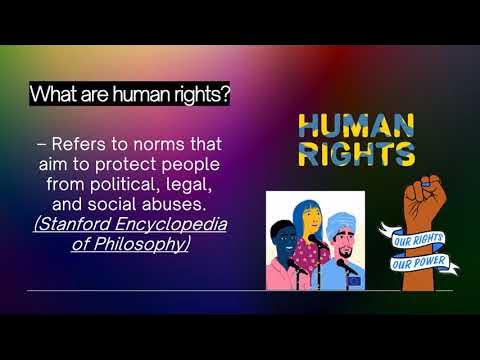¿Qué son los Derechos humanos? - Bully Magnets - Historia Documental
Summary
TLDRThis video explores the evolution and importance of human rights, emphasizing their inalienable and universal nature. It traces the historical development of human rights from civil and political freedoms to social, economic, and cultural rights. The Universal Declaration of Human Rights, while widely recognized, lacks enforcement power, leaving human rights violations largely unpunished. The video highlights the ongoing struggles for equality, justice, and the emerging challenges of digital rights in the modern world, stressing the need for continued advocacy and awareness to protect and expand these fundamental rights.
Takeaways
- 😀 Human rights are inalienable and universal, meaning they apply to all people simply because they exist.
- 😀 Human rights are not privileges that can be given or taken away—they are inherent to all humans.
- 😀 The concept of human rights has evolved over time, with different generations advocating for different rights.
- 😀 The first generation of human rights focused on civil and political rights, including freedom of thought, opinion, and the right to choose leaders.
- 😀 The second generation introduced social, economic, and cultural rights, such as the right to education, health, work, and social security.
- 😀 The third generation emphasized solidarity rights, which include peace, international cooperation, and the right to a healthy environment and self-determination.
- 😀 The United Nations (UN) and its Universal Declaration of Human Rights, established after World War II, laid the foundation for modern global human rights standards.
- 😀 The Universal Declaration of Human Rights asserts the equality and dignity of all humans, highlighting non-discrimination and rights like freedom from torture, slavery, and the right to liberty.
- 😀 The declaration covers both negative rights (freedom from oppression) and positive rights (freedom to move, express, and work), including economic and social rights.
- 😀 Despite the global recognition of human rights, violations often face minimal consequences, as the UN cannot force states to alter their policies or directly compensate victims.
- 😀 The definition and scope of human rights continue to evolve, especially in response to emerging issues such as digital rights and privacy in the modern, increasingly digital world.
Q & A
What are human rights?
-Human rights are the fundamental rights and freedoms that every person is entitled to simply by being human. They are universal and inalienable, meaning they cannot be granted or taken away.
Why are human rights considered inalienable?
-Human rights are inalienable because they cannot be taken away or surrendered, regardless of an individual's actions, status, or any external circumstances.
What is the historical evolution of human rights?
-Human rights have evolved over time in response to various social movements and historical events. The first generation focused on civil and political rights, while the second generation addressed social, economic, and cultural rights. The third generation expanded on these by focusing on solidarity rights and international cooperation.
What significant historical events led to the development of human rights?
-Key historical events that contributed to the development of human rights include the French Revolution, the independence movements in the Americas, and the aftermath of World War II, which led to the creation of the United Nations and the Universal Declaration of Human Rights.
What does the Universal Declaration of Human Rights establish?
-The Universal Declaration of Human Rights, written by the United Nations, establishes that all humans are born free and equal in dignity and rights. It includes principles like non-discrimination, the right to life and liberty, and various freedoms such as freedom of expression and religion.
What are the challenges in implementing human rights?
-While human rights are widely recognized, their implementation is challenging because they are not legally binding in many cases. Violations may occur without sufficient enforcement or consequences, as countries may not be compelled to change their policies.
How does the UN monitor and protect human rights?
-The United Nations monitors and protects human rights through its various organs, which investigate violations and encourage adherence to human rights principles. However, they lack the power to enforce binding changes on states.
What are some examples of human rights under the Universal Declaration?
-Examples include the right to freedom of movement, the right to education, the right to choose one's employment, the right to a fair salary, and the right to be free from torture and slavery.
Why is the concept of 'solidarity rights' important?
-Solidarity rights focus on the collective well-being and cooperation between nations, emphasizing global peace, environmental protection, and the rights of people to self-determination and economic independence.
What are some modern challenges to human rights in the digital age?
-As life becomes more digital, issues like the right to internet access, digital privacy, and data protection have emerged as essential human rights, raising concerns about the balance between security, freedom, and privacy.
Outlines

This section is available to paid users only. Please upgrade to access this part.
Upgrade NowMindmap

This section is available to paid users only. Please upgrade to access this part.
Upgrade NowKeywords

This section is available to paid users only. Please upgrade to access this part.
Upgrade NowHighlights

This section is available to paid users only. Please upgrade to access this part.
Upgrade NowTranscripts

This section is available to paid users only. Please upgrade to access this part.
Upgrade Now5.0 / 5 (0 votes)





